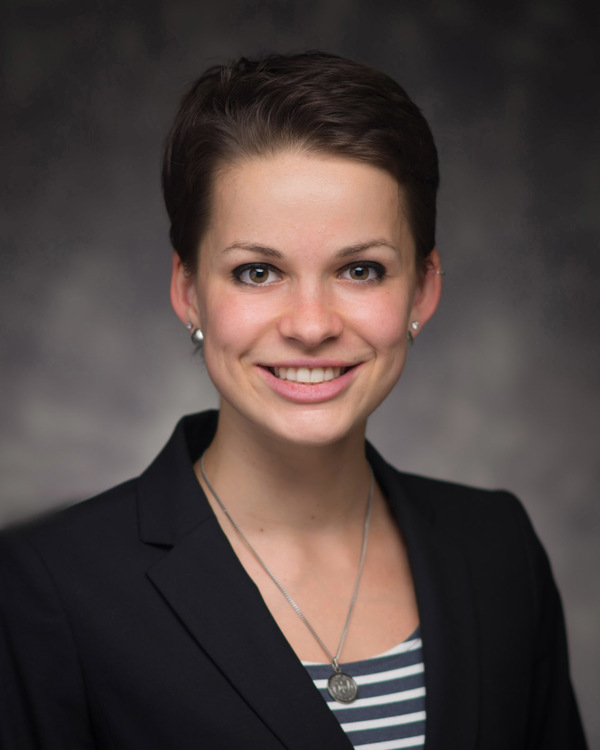From NDIAS Research Assistant to Marshall Scholar: An Interview with Sofia Carozza

Prior to being selected as a 2019 Marshall Scholar, Sofia Carozza worked for two years as an undergraduate research assistant at the Notre Dame Institute for Advanced Study. In a recent interview, the senior neuroscience major reflects on the work she did with the NDIAS and lasting impact it had on her.
Through exploring intensely interdisciplinary questions, I grew to appreciate the universality of such research, while questioning the intense specialization of my discipline of neuroscience. I began to approach my classes the same way I approached my NDIAS projects, reading with a mind to discover any underlying claims about ideas, beliefs, and the truth of the human condition.
Can you tell us a bit about the research you conducted as an NDIAS research assistant?
I participated in three projects while an NDIAS research assistant. First, I assisted Dr. Paul Ramirez of Northwestern University on his project, Salt of God: A Religious History of Mexico. Then, I assisted Dr. Tom McLeish on his project, The Poetry and Music of Science: A Comparison of Creativity in the Arts and Sciences. Finally, I assisted Msgr. Tomas Halik on his project, The Theological Hermeneutics of Contemporary History. As you can see, the projects spanned a wide range of disciplines and subjects.
What sorts of things did do while working on those projects, and what did you learn in the process?
Over the course of my two years at NDIAS, I completed incredibly diverse tasks, from translating records of the Mexican inquisition to extracting the creative process of prominent authors from transcribed interviews. Along the way, I cultivated curiosity, the disposition of being be provoked by reality into asking “why?” or “how?” and following those questions. I practiced diligence and systematic organization to keep the projects moving forward. I exercised my judgment, both in collecting and interpreting data and in troubleshooting problems. I developed strong communication skills within the project and in translating its significance to the broader scholarly community and public.
Did you face any challenges along they way, and if so, how did you grow from them?
I was challenged by the broad horizons of the projects on which I worked. Not only did I have to synthesize information from vastly different disciplines but I had to constantly reconcile minute details with broader questions of meaning and value. Having always conducted specialized biological research in the past, I was unused to such an integral, open approach to research. However, this was also the most rewarding aspect of my assistantship. Through exploring intensely interdisciplinary questions, I grew to appreciate the universality of such research, while questioning the intense specialization of my discipline of neuroscience. I began to approach my classes the same way I approached my NDIAS projects, reading with a mind to discover any underlying claims about ideas, beliefs, and the truth of the human condition. In the end, my assistantship taught me to how to engage cross-disciplinary questions of value, and instilled in me a deep desire to settle for nothing less.
Finally, tell us a little about what you plan to research as a Marshall Scholar.
For the Scholarship, I plan to pursue an MPhil in Basic and Translational Neuroscience leading into the PhD in Psychiatry at the University of Cambridge. I will conduct research on the neuroscience of childhood trauma, characterizing changes in brain architecture due to toxic stress and identifying mechanisms of resilience. Ultimately, I hope to dedicate my career to translating developmental neuroscience research into public awareness, effective therapies, and social and policy change.
To learn more about the undergraduate research opportunities offered by the NDIAS, visit ndias.nd.edu/student-research.
Contact:
Kristian Olsen / Fellowships, Outreach, and Operations Program Manager
Notre Dame Institute for Advanced Study / University of Notre Dame
kolsen1@nd.edu / 574.631.2830
ndias.nd.edu / @NotreDameIAS
About the Notre Dame Institute for Advanced Study:
The NDIAS supports research that is directed toward, or extends inquiry to include, ultimate questions and questions of value, bringing together leading thinkers from around the world to live and work at the University as fellows in a residential intellectual community. These cross-disciplinary scholars, scientists, and artists pursue innovative research projects as they engage and contribute to the research of Notre Dame colleagues and students from multiple disciplines, augmenting the life of the mind on campus.